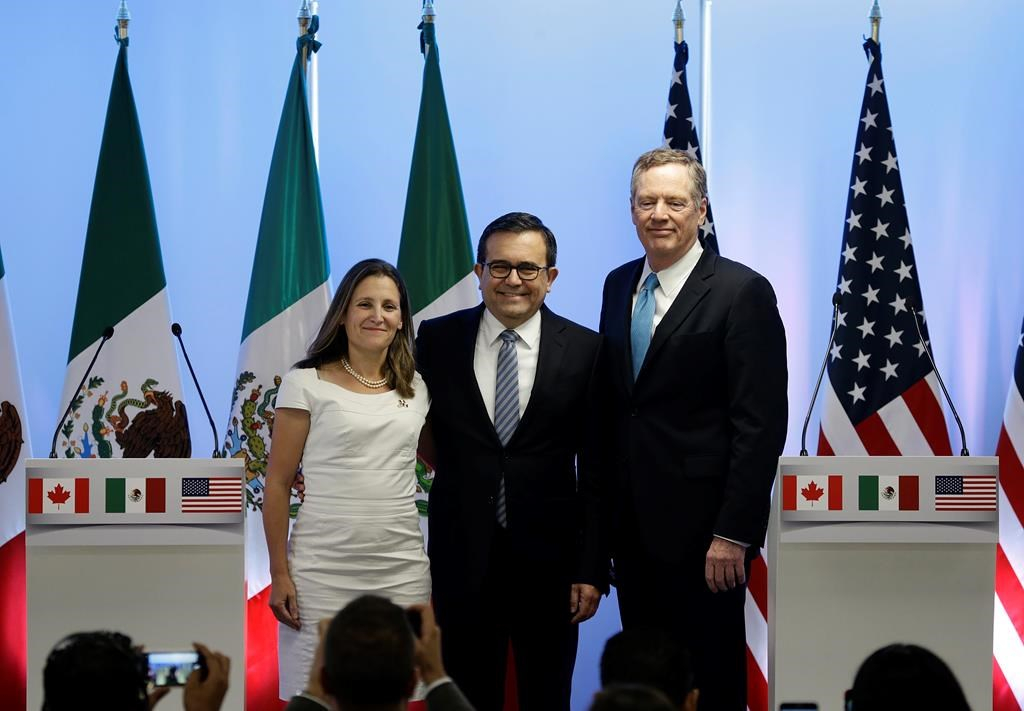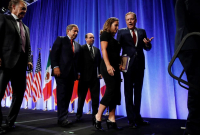Support strong Canadian climate journalism for 2025
The latest round of NAFTA negotiations wrapped up Tuesday with the three countries declaring they have made progress, and committing to work through the harder negotiating issues in time to get a deal by the end of the year.
The three lead ministers say they're pleased with what's been accomplished as the talks move to Ottawa for the next round, scheduled to run from Sept. 23-27.
While sources say there has been no serious movement yet on any of the more sensitive issues, the countries say they have tabled two dozen texts that will form the backbone of the chapters in a modernized North American Free Trade Agreement.
During Tuesday's closing news conference, Foreign Affairs Minister Chrystia Freeland repeatedly stressed that it's normal for the major sticking points to remain unresolved at this point in the process.
The countries have started working through the easier issues, and have tabled texts, and have had a chance to learn each other's priorities, Freeland said.
"I want to reiterate: This is Day 20," she noted. "This is an extremely accelerated process. This is Day 20 of an accelerated and extremely comprehensive negotiation.... We are running fast for (an agreement by) the end of the year.
U.S. trade czar Robert Lighthizer extended his thanks to both North American neighbours for their best wishes in the wake of a devastating hurricane in Texas and Louisiana.
Lighthizer said two dozen chapter texts have been tabled, and though he reiterated some of his tough talk from the opening round, where he lamented the devastation caused by NAFTA, he struck a less aggressive tone.
"Our work continues at a record pace," he said.
"These (new) chapters represent a new modern agreement which, once concluded, will support robust economic growth in North America for decades to come."
The agreements reached so far relate to less-controversial parts of the agreement.
Multiple sources say the countries have not even begun dealing with the more complex elements — and that any attempts by one party to raise a contentious issue have been brushed off by the other parties.
That's true of Canadian proposals like some labour reforms, which have been declared a non-starter by the U.S.
It's also true of the U.S. desire to secure more dairy sales in Canada. The U.S. tried informally starting the conversation, and sources say Canada pushed it off.
Freeland said it's normal to put off the hardest topics.
She said a negotiation starts by learning where other countries' priorities are. She compared it to her former work as a journalist: The first step is gathering information, and the final step is using it to produce a finished product.
The countries were conducting that vital research phase during the five-day negotiating round in Mexico, she said.
"It's about figuring out, 'What are you trying to achieve? What are your objectives?'" she said.
"If your counter-parties really understand what you're trying to achieve, and you understand what they are really trying to achieve, that is a precondition for actually doing a deal... So in 20 days ... we feel we have really gone a very long way to understanding each other."
The round played out under the cloud of multiple threats from U.S. President Donald Trump.
Entering the negotiations, he threatened to withdraw from NAFTA. On the final day, he announced plans to kill an amnesty program for young immigrants brought illegally into the U.S. by their parents.
The latter was a huge story in Mexican media, including one front-page newspaper that warned of the possible expulsion of more than 622,000 Mexican-born people who registered for the program after Barack Obama created it.
Freeland, asked directly about the controversy, refused to address it. She said she gets paid in Canadian dollars, not pesos, and is in Mexico at these negotiations to advance the interests of her country.
While she was speaking, the U.S. trade czar was holding a briefing session with reporters in which non-U.S. media were banned from attending.
The Trump question came up there too. Lighthizer was asked about his boss's threats to terminate NAFTA. One account of the exchange, surfacing on Twitter, suggests Lighthizer refrained from echoing it.
"I'm not taking that position," a reporter with Inside U.S. Trade quoted Lighthizer as saying. "I want a good agreement."





Comments